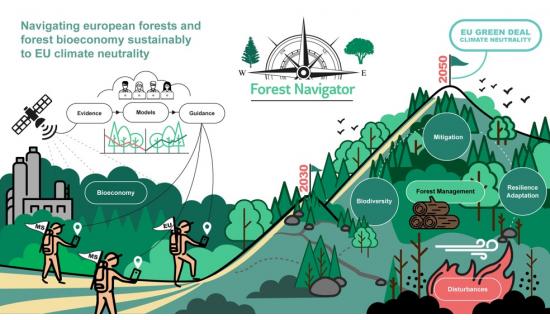Project ForestNavigator
Navigating European Forests and forest bioeconomy sustainably to EU climate neutrality
ForestNavigator aims at assessing the climate mitigation potential of European forests and forest-based sectors through modelling of policy pathways, consistent with the best standards of LULUCF reporting, and informing the public authorities on the most suitable approach to forest policy and bioeconomy. ForestNavigator zooms primarily into selected EU Member States to enhance the consistency of the EU and national pathways, and add a focus on the global scale and selected key EU trading partners, to account for extra-EU future drivers and potential leakage effects.
The project relies on a newly developed integrated policy modelling framework for the EU forests and forest bioeconomy which covers: i) all relevant mitigation strategies from forest management to energy and material substitution, ii) climate change impacts, adaptation, and natural disturbances, iii) biophysical climate feedbacks, iv) systematically accounting for impacts on biodiversity, forest ecosystem services, and other forest functions, including jobs and green growth.
To increase the accessibility of the models and pathways assessments, as well as their understanding and transparency, a novel decision-making platform is established consisting of the web-based ForestNavigator Portal, and a community of policy-makers, national authorities, and modelers, the Forest Policy Modelling Forum.
To reach its objectives, ForestNavigator will i) harmonize, integrate and continuously update existing datasets by, including national inventories with new remote sensing data and models ii) start from complex forest and climate models and through emulators build them into operational policy modelling tools, iii) integrate biophysical and socio-economic information, iv) consider EU forests and forest bioeconomy in the broader context of other land use and economic sectors, v) rely on input from policy makers and other stakeholders.
ENEA contributes to the project with several actions. In addition to participate to the management of a dynamic stakeholder dialogue, which infers the difference in needs and key challenges amongst different interests at play, it supports the evaluation of forest management costing curves to inform integrated modeling and assess spatial explicit costs for afforestation and management under different assumptions. Most importantly, ENEA will lead the activity of recreational and cultural services evaluation by identifying monetary values associated to different types of forest management. Finally, ENEA will take part to the design of the ForestNavigator Portal and to the production, communication and dissemination of project results.

